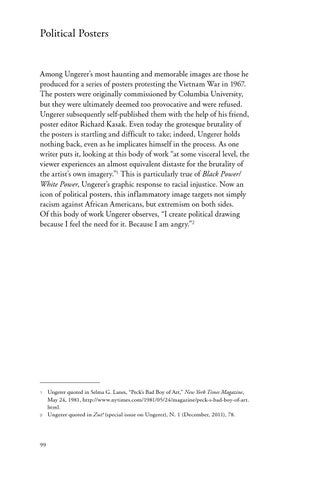Political Posters
Among Ungerer’s most haunting and memorable images are those he produced for a series of posters protesting the Vietnam War in 1967. The posters were originally commissioned by Columbia University, but they were ultimately deemed too provocative and were refused. Ungerer subsequently self-published them with the help of his friend, poster editor Richard Kasak. Even today the grotesque brutality of the posters is startling and difficult to take; indeed, Ungerer holds nothing back, even as he implicates himself in the process. As one writer puts it, looking at this body of work “at some visceral level, the viewer experiences an almost equivalent distaste for the brutality of the artist’s own imagery.”1 This is particularly true of Black Power/ White Power, Ungerer’s graphic response to racial injustice. Now an icon of political posters, this inflammatory image targets not simply racism against African Americans, but extremism on both sides. Of this body of work Ungerer observes, “I create political drawing because I feel the need for it. Because I am angry.”2
1
2
99
Ungerer quoted in Selma G. Lanes, “Peck’s Bad Boy of Art,” New York Times Magazine, May 24, 1981, http://www.nytimes.com/1981/05/24/magazine/peck-s-bad-boy-of-art. html. Ungerer quoted in Zut! (special issue on Ungerer), N. 1 (December, 2011), 78.
